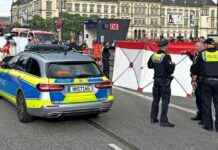Home product broken in the mysteries of the group, the new CEO does not arrive to overturn the table: he should continue the main lines of the strategy led by his predecessor: the shift towards electric and connected mobility.
“The management board around Herbert Diess has done a good strategic and technological job,” admitted Thursday Mr. Blume before a seminar bringing together the group’s executives.
He takes the head of a management board reduced from 12 to 9 members and will focus on “strategy, quality, design and the subsidiary of Cariad software”, according to a press release.
This 54-year-old German adds that he will be keen to “rebuild team spirit” within the group.
His predecessor mainly owed his ousting in July to repeated tensions with staff representatives and the management team, fueled by his direct and provocative style.
However, Mr. Blume arrives at the controls at “a difficult moment” in the life of the first European manufacturer, observes Matthias Schmidt, analyst specializing in electric cars.
The context is more uncertain than ever with the war in Ukraine and the persistence of component shortages.
He will also have to lead the IPO of the Porsche subsidiary this year and resolve the difficulties that are slowing down the development of Volkswagen software, which is supposed to be the heart of the car of the future.
The electric and connected revolution involves tens of billions of euros of investment, while the group posted mixed results in the second quarter
– No “wars” –
Joined VW in 2015, until then chairman of the board of directors of Porsche, Oliver Blume is reputed to be more conciliatory than Herbert Diess.
“Blume is not someone who leads wars”, summarizes for AFP Ferdinand Dudenhöffer, director of the Center Automotive Research.
In detail, the new boss could stand out on the issue of synthetic fuels.
Made from CO2 in particular in the atmosphere using electricity, they allow the use of traditional engines with very low CO2 emissions.
Herbert Diess had chosen to bet everything on battery-powered cars, unconvinced by the efficiency of synthetic fuels.
“We will maintain the pace” of the electric strategy and “accelerate where possible”, launched Oliver Blume to the leaders.
Non-fossil fuels are however “complementary” and have certain “advantages” in particular for their transport and the compatibility with existing gasoline pumps, detailed Mr. Blume in an interview.
– Homemade batteries –
If the use of synthetic fuels on a large scale is not an option, talking about it allows us to imagine a future for the combustion engine.
The delicate subject will be decided in Brussels, which is currently working on a possible ban on new non-electric individual cars from 2035.
Oliver Blume could weigh in for an extension of engines using alternative fuels.
At the risk, conversely, of not being able to advance “fully” on electric like Tesla, the American competitor who is a pioneer, warn the experts.
Another project for Mr. Blume?: software, the Achilles heel that precipitated the exit from the road of the former CEO.
While Herbert Diess wanted to make significant profits by carrying out the coding in-house, his successor could rely more on suppliers.
Because “to make the software work, you need coders and not automotive engineers”, summarizes Mr. Schmidt.
The new boss, on the other hand, should confirm the decision to focus more on the American market in order to limit dependence on China.
The in-house manufacture of battery cells, a key component of electric cars, will remain at the heart of the strategy.
For its six European battery mega-factory projects with a capacity of 40 GWh each, and one in the United States, Volkswagen has created a dedicated “PowerCo” entity, which could welcome external investors.
“That may well be the Diess legacy, as well as pioneering electrification after the dieselgate scandal” of rigged engines, according to Mr Schmidt. It is up to his successor to make the legacy bear fruit.




















